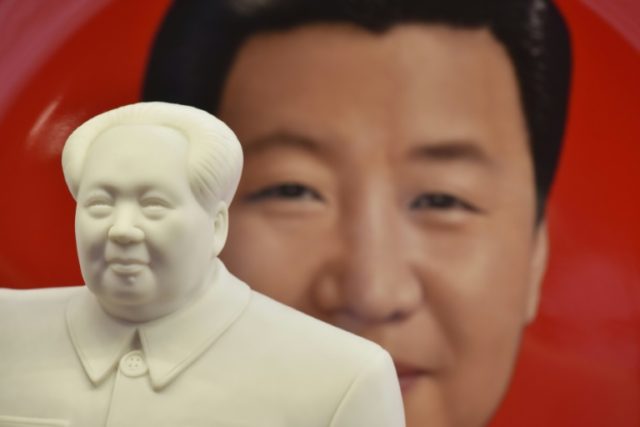The most popular app on the Chinese version of Apple’s app store is currently “Study to Make China Strong,” a program that spits out nuggets of Communist Party propaganda.
Reuters on Monday revealed the app was created by Alibaba, a Chinese tech and e-commerce giant listed on the New York Stock Exchange. The revelation provides more disturbing evidence of the close connection between the Chinese Communist government and nominally “private” industries that do a growing volume of business in the Western world.
“Study to Make China Strong” is nominally a product of the Chinese government. Its name in Chinese is “Xuexi Qiangguo,” which is taken as a play on words because the “xi” character in its title also happens to be the name of China’s authoritarian ruler, Communist Party leader Xi Jinping.
The app offers some social media toys to users, but its primary purpose is to bolster Xi’s personality cult and push his political philosophy, “Xi Jinping Thought,” which has been incorporated as a core element of Chinese Communism. Users can win prizes by taking quizzes about Xi’s life and writings.
The UK Guardian pointed out on Friday that the “dizzying success” of the app, which supposedly racked up 43 million downloads and overtook all other programs in popularity in just a few short weeks, is artificial: the government simply ordered Communist Party members to download it and instructed local officials to promote it very aggressively to their citizens.
The Guardian quoted reports of Chinese employers making the propaganda app part of their employee evaluation process, with low quiz scores becoming a barrier to promotion. Users report being pressured to download the app and suffering public shame if their quiz scores are not high enough.
Two sources inside the Alibaba corporation told Reuters on Monday that a secretive special projects team known as the “Y Projects Business Unit” created the app.
Reuters noted the link between the company and the Communist propaganda instrument is fairly obvious, because the social media component of the app is built on Alibaba’s “DingTalk” messaging platform, and DingTalk users can log into Xuexi Qiangguo with the same name and password. Furthermore, Alibaba’s job website is currently advertising positions related to supporting the Xuexi Qiangguo app.
Reuters described the app as the latest instance of tight coordination between the Chinese Communist government and “private” business entities, quoting a consultant who observed that Chinese companies know better than to refuse when the government wants something, or else they might be frozen out of future business opportunities and denied valuable licenses. Chinese companies are prepared to throw money and resources into guaranteed-loser projects to curry favor with the Communist Party.
The news about Xuexi Qiangguo comes at a moment when China is furiously attempting to persuade Western governments that Chinese corporations are not willing tools of the Communist Party. Tech companies have been under especially heavy scrutiny, as in the case of allegations that products of the Huawei corporation are unsafe because they could allow Chinese intelligence agents to compromise global wireless networks. Alibaba co-founder Jack Ma caused a stir in the global business community in November when his active membership in the Communist Party was revealed.
Chinese firms have been making some progress in their public relations effort. Monday brought news that Britain’s National Cyber Security Center believes the espionage risk from Huawei products can be managed, The Canadian government is nervous about joining the U.S. and Australia in excluding Huawei products from 5G wireless infrastructure because the cost of an outright ban could be enormous.
Western investors cling desperately to the idea of independent Chinese businesses because they want a piece of the action. For example, Alibaba’s stock has been surging throughout the new year and may still have room to grow. The company is generating tremendous income from online retail sales, cloud services, and electronic media content. Alibaba offers a digital wallet service called Alipay that has over a billion active users.
Alibaba’s business partners in the free world would prefer not to dwell on the idea their dollars could be flowing into Communist Party operations, or acknowledge the reality that doing business with Chinese firms means giving Beijing political influence over global marketplaces.
Consider how easily the Chinese government was able to turn Xuexi Qiangguo into “the most popular app in China,” and by extension one of the most popular in the world. It could make other products appear more, or less, popular with equal ease to manipulate investment decisions and consumer purchase far beyond China’s borders.

COMMENTS
Please let us know if you're having issues with commenting.